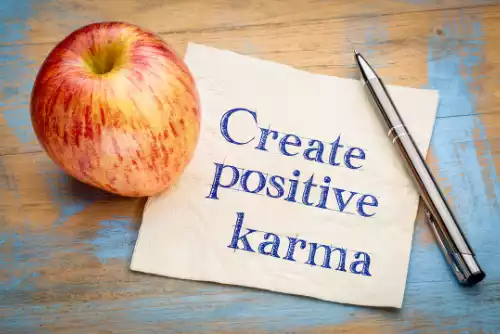Table of Contents
Have you ever wondered what the true meaning of the term Karma means? Probably you have come across the word and never bothered to probe deeper.
Karma is an ancient belief system that holds that a person’s actions have consequences, both positive and negative. The idea of karma has been around for thousands of years, originating in Asian faiths such as Hinduism and Buddhism. But it is not limited to these religions; it is part of the spiritual beliefs of many cultures around the world.
The concept of karma aims to promote responsible behavior by instilling a sense of morality within its followers. It encourages people to live their lives ethically in order to avoid bad Karma and encourage good Karma. This is most often done through following dharma—a set of moral duties or responsibilities.
Karma can be broken down into two distinct categories—actions that lead to good Karma and those that lead to bad Karma. Good Karma includes acts of kindness and generosity, while bad Karma includes selfishness and taking advantage of others. In either case, it follows a strict cause-and-effect principle; deeds have results that must be faced sooner or later.
If you probe deeper into the Karma concept, you will realize the following:
First, good or bad actions can be returned to you in this life or the next one. What everyone considers bad Karma on someone else may actually be a masked blessing.
Karma is, therefore, a more complex concept than many of us think of it. Sometimes our behaviors and thoughts are influenced by changing lifestyles.
Knowing your Karma
Good Karma and bad Karma are both rooted in the individual’s mind. The cause of good karma starts with noble intentions, while bad karma is the result of unwholesome thoughts that emerge from an undisciplined mind. To truly understand how Karma works, it’s important to become aware of your thoughts and possible consequences before taking any action.
Having a deeper understanding of what it means can help you make mindful decisions that allow you to increase your good and decrease your bad karma. Additionally, questioning yourself about your motivation behind every action will provide insight into whether or not you should proceed with it.
Karma is also affected by intentionality—if a person intends to do something negative, but their actions unintentionally result in a positive outcome, then they receive good Karma for that action. Conversely, if someone tries to do something good, but their actions end up having a negative outcome, then they reap the bad Karma for the deed. Understanding this provides further incentive for people to be mindful of their thinking and behavior.
How does your Karma affect you?
The effects of Karma have a lasting impact on one’s life. Good Karma is the result of performing noble acts and showing kindness, while bad Karma is the consequence of unwholesome deeds. Your Karma serves as a reminder of your thoughts and decisions and will influence your life in many ways.
Good karma can bring positive experiences such as good health, abundance in wealth, and blessings from others. You may also find that you experience fewer problems and enjoy more favorable situations due to having done the right thing.
On the flip side, bad karma can lead to negative effects such as ill health, financial problems, or strained relationships with friends and family members. It can even manifest itself in physical symptoms such as anxiety or depression, which are often warning signs that something needs to be changed.
Karma is not an absolute punishment for wrongdoings; rather, it is an opportunity for growth and learning. By recognizing our mistakes, we are given a second chance to make better decisions that could improve our lives in the future.
Understanding the Laws of Karma
The Law of Karma states that for every action, there will be a reaction. This law applies to both the spiritual and physical realms and is based upon three principles: cause and effect, sowing and reaping, and action and reaction.
It is believed that our experiences in life are a direct result of the choices we make – based on our thoughts, words, actions, and intentions. We will reap what we sow; if we act kindly towards others, good things will come back to us. Similarly, if we cause harm or speak unkindly to another person, this energy will return to us in some manifestation or form.
The Laws of Karma also dictate that all beings must experience the effects of their past deeds. In Hinduism and Buddhism, this idea is known as ‘karmic debt’ – a type of cosmic debt that must be paid off before this cycle can end. As each person accumulates more karmic debt throughout their lives, they become responsible for repaying it by making better choices in the future.
Karma is a powerful force that governs the spiritual world and should not be taken lightly – it has the power to shape one’s destiny. Those who strive to live ethically can expect positive outcomes from their actions, while those who choose negative paths may face challenges along the way. By following the laws of karma, we can create a better life for ourselves – both now and in the future.
Practicing Positive Karma in Everyday Life

Practicing positive karma in everyday life is the best way to ensure peace and harmony in our lives. The saying “what goes around comes around” is especially true when it comes to karma, so it’s important to put out good energy into the world so that it can be returned to us.
One of the simplest ways we can practice positive karma is by treating others with kindness and respect, both online and off. It also pays to follow a few simple rules, such as being honest, forgiving easily, offering help where it’s needed, and speaking kindly about others.
It’s also beneficial to have a mindful attitude towards our environment by conserving resources such as water and electricity. Taking part in activities like recycling or volunteering for a charity will have a significant impact on society – not only are you helping others, but you are also creating positive energy that will come back to you in time.
Finally, make sure that you take some time every day for yourself too. Meditation and yoga are great ways of helping you relax and connect with your inner self – something which can help bring balance back into your life. By following these simple steps, we can ensure that we always remain connected with positive karma!
How to Create Good Karma
- Be kind and thoughtful to others
- Help those in need and practice philanthropy
- Treat yourself with love and respect
- Put good intentions into all your actions
- Take time each day for mindfulness and meditation
- Cultivate an attitude of gratitude
- Let go of negative thought patterns/beliefs that may be causing bad karma
- Do random acts of kindness for strangers
- Be generous with compliments & words of encouragement
- Pay it forward – do something nice for someone else out of the goodness of your heart
- Volunteer your time to a worthy cause
- Stay away from gossip and always be respectful of others
- Be honest and ethical in all your dealings
- Practice humility instead of pride
- Uplift and encourage those around you
- Show compassion and appreciation for the world we live in
- Live with integrity, doing what is right even when no one is watching
- Speak up for what is right and take a stand against injustice
- Be open to giving and receiving love unconditionally
- Keep your promises, and don’t take people or situations for granted
- Listen more than you speak and strive to understand before being understood
- Enjoy the present moment and find joy in simple things
- Leave the world a better place than how you found it
How to Get Rid of Bad Karma
Getting rid of bad karma is no easy feat, but with the right mindset and practices, it can be done. The first step is to recognize which actions of yours have had a negative impact on others and make amends where possible. Then, look within and identify any thought patterns or beliefs that are causing you to take part in behaviors that create bad karma. It’s also important to practice self-forgiveness – letting go of the guilt and shame associated with past actions can help break the cycle of bad karma.
The next step is to actively replace negative behavior with positive ones. This could include volunteering or taking time out each day for mindfulness or meditation. Finally, try to cultivate an attitude of gratitude, as this will help focus your mind on the good things in life rather than dwelling on what you don’t have. With a little effort and commitment, getting rid of bad karma can lead to a happier, more fulfilling life!
The easiest way is my Karma Cleansing Spell, which is specially designed to remove bad karma and create good karma.
The Benefits of Having Good Karma
Having good karma can bring many benefits to an individual’s life. It is believed that by consciously engaging in positive actions, one can attract more positive energy into their life. This can manifest itself in various forms, such as abundance, success, and even improved relationships with others.
The benefits of having good karma go beyond just materialistic gains – it has the power to transform the way we think and act on a daily basis. Those who actively practice positive karma are likely to feel more contentment and joy in their lives as they become more aware of their choices and how they impact the world around them.
Having good karma also encourages us to be kinder towards others, as well as ourselves. Through our actions, words, and thoughts, we send out vibrations that affect everyone we come into contact with – so it pays to keep this energy as positive as possible! By doing so, we create a ripple effect that has the potential to positively change those around us.
Good karma isn’t only beneficial for ourselves – it can also have a profound effect on those closest to us. When we make conscious efforts to engage in positive practices such as helping others or self-reflection, our loved ones will likely reap the rewards too! So make sure you take the time each day to cultivate your own good karma and help spread its blessings far and wide!
Conclusion
Karma is a powerful tool that we can use to bring more balance and harmony into our lives. By understanding the laws of karma and actively practicing positive actions such as helping others, being kinder, and taking time for ourselves, we can create more meaningful relationships, have healthier life choices, and ultimately reap the rewards of having good karma. It’s important to remember that each action we take has consequences, so it pays to make sure we are creating energy that is positive and beneficial not only for ourselves but for those around us too!
Remember – what goes around comes around!
High Priestess Memoona is a well-known and respected spell caster and magical practitioner with more than five decades of experience. She is a master of her craft, having used her powerful abilities to bring people joy, unconditional love, and prosperity. With her unique approach to spell casting, High Priestess Memoona has helped countless individuals manifest their life dreams and achieve their goals. Her expertise and dedication to the craft have made her a highly sought-after Spell Caster, and she is proud to be able to offer her services to those who seek her aid.

